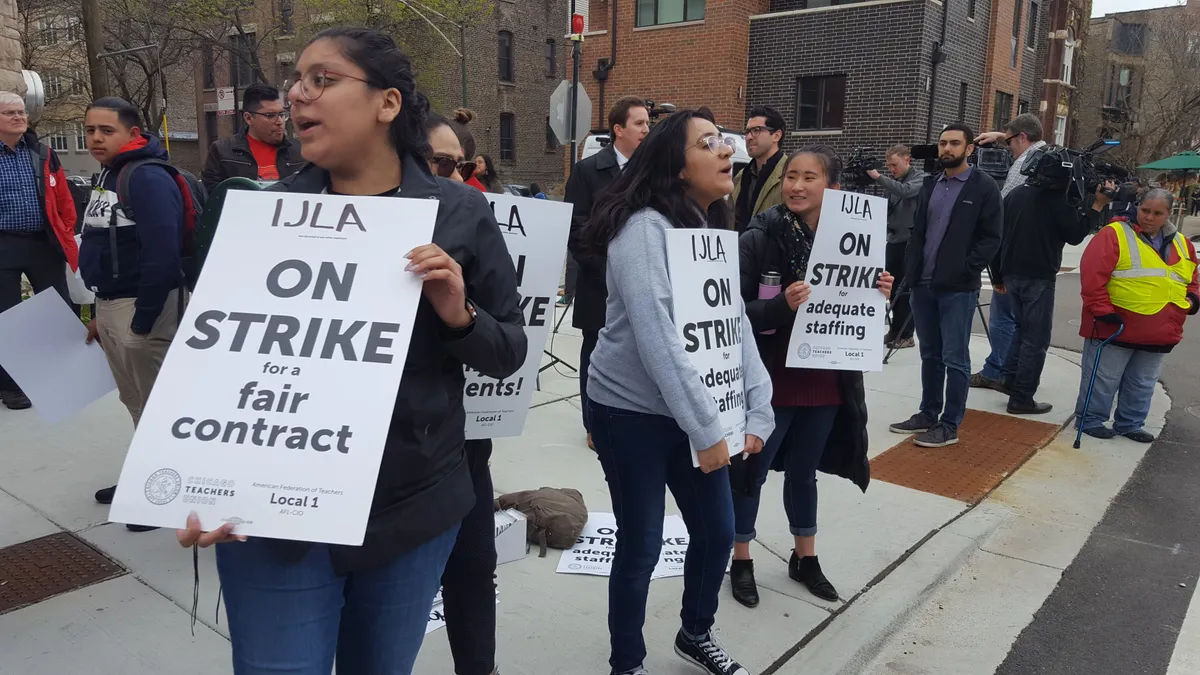BOSTON — The past two years have seen a flurry of teacher strikes nationwide, with more than pay on educators' minds and more likely on the horizon in the coming school year. The 2018 election season also saw close to 1,800 educators run for state and federal office, deciding to take policy into their own hands.
A State of American Education panel at the 2019 National Principals Conference veered into one of the liveliest realms of K-12 policy discussion with a conversation on teacher and student activism.
Reach Consulting CEO Aimy Steele, a former principal of Beverly Hills STEM Elementary School in Concord, North Carolina, who left the principalship to pursue public office in 2018, started by sharing her teacher activism experiences. She recalled being an administrator and constantly having a barrage of laws, policies and procedures passed down to her from her state superintendent, her local superintendent, and “also anyone in the school board or in the area who really wanted to do their best to follow all the laws and rules and policies, which I do, as well.”
In North Carolina, she said complying with class size legislation policy would have required her to make sure K-3 class sizes were in a particular space.
"When I received that call to make space available for five more teachers — knowing that we could only use the library, the cafeteria, the media center, the art room and the music room, and essentially displace these teachers and make them rolling cart teachers — I knew that something had to be done," Steele said.
"In that moment, I became the one who said, 'If not me, then who? If not now, then when?'"
Oklahoma State Superintendent of Public Instruction Joy Hofmeister recalled Oklahoma's teacher strike and how families rallied behind teachers, who stayed amid revenue shortfalls and the erosion of funds for the past decade. Educators' walkout at the capitol was about more than pay, she said, as a $6,100 raise happened six days prior in response to just the threat of a strike.
On day seven, there were 50,000 people at the capitol, and everyone wanted to join what was happening. "Teachers told the story of the children in their classrooms, and it changed everything," Hofmeister said.
Teach Plus President and CEO Roberto Rodriguez, who also served as a domestic policy advisor to President Barack Obama, added that many people often don't understand educators' low levels of pay or the amount of time they invest, or that many are having to work two or three jobs to make ends meet. On top of that, zip codes and neighborhood conditions still too often predetermine students’ chances for success.
But policymakers are being reminded by the current level of activism that educators are the closest to students' needs at school and are in a position to raise their voices for them, he said, noting that he’s encouraged that educators are at the forefront of the public waking up to these concerns.
Balancing student safety and activism
"I think the voice of our students and our learners has to be front-and-center in the policymaking process," Rodriguez said, adding that the lived experiences students share around conditions in schools, classroom needs, and their connections to teachers and principals is necessary for context for policymakers.
Menlo Park City School District Superintendent Erik Burmeister then shifted discussion to the surge of student activism following the mass shooting at Marjory Stoneman Douglas High School in Parkland, Florida, last year.
When educators talk about the kind of learning they want students to be doing around arguing an opinion and collaborating with people who think differently, he said, they can’t in good conscience create schools focused wholly on obedience and compliance, where students are told to be quiet and sit in their seats and construct their arguments in a certain way "that feels good to us."
"We as educators walk a fine line of balancing student safety and discipline and so forth," Burmeister said. "But we have a very unique opportunity to raise the voices of our students and the opportunity for students to enter into political discourse in a way that is different than we see on 24/7 news networks. I would hope that we wouldn't shy away from that.”
He said educators should embrace students doing this around topics they're passionate about because these are amazing teaching opportunities, even if “civil disobedience” means they might sometimes get in trouble.
“That is what's going to prepare our kids for a world that has a discourse hopefully different from the one we’re currently having.”







 Dive Awards
Dive Awards
















